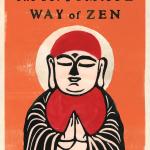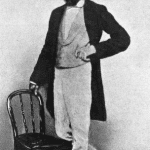I first practiced Zen in the Soto style, with its emphasis on the deep discipline of Just sitting. Later I entered a Soto monastery where I encountered Japanese Zen’s monastic discipline of minute attention to the details of life. Later after I left the monastery and other spiritual disciplines I began a small sitting group on the Russian River in northern California.
Among the snakes and dragons that wandered into my zendo was a former monk in the Kwan Um. While he lacked a formal authorization as a teacher, he had practiced for a decade and had for a time even been abbot. And he was deeply experienced on the koan way. I pestered him to introduce me to koan practice.
Finally he agreed. And he gave me a koan. All things return to the one. To what does the one return? To my shock, and maybe to his, I knew the answer. And with that I began the most important formal discipline in my spiritual life.
On our most recent all day sit at Empty Moon Zen, my friend and student and dharma successor, Zen teacher Ed Oberholtzer gave the dharma talk. He chose the koan All things return to the One. To what does the one return?
It touched me deeply. And, I asked if I could share it on my blog. He agreed.
James Ishmael Ford
***
All Things Return to the One
A Dharma talk by Edward Obherholtzer
At some point, around thirteen hundred years ago, a young man, whether through mischievousness, a desire to trip an old man up, or, perhaps, just perhaps, as an earnest inquiry; this monk went up to an ancient and venerable teacher, Chaochou, and asked a question usually put to a beginner on the koan path; one of the dharmakaya koans; one of the koans meant to elicit an initial taste of the boundless, that old chestnut “All things return to the One. To what does the One return?”
I picture Chaochou, a teacher renowned for his grandmotherly ways, a teacher of whom it was often said that when he spoke, light sparkled on his lips, I picture him gazing wistfully into the distance as he answered, “When I was living in the province of Qingzhou, I made a cloth robe. It weighed seven pounds.” Not, I’m sure what the young monk was expecting. Now, to be honest, a seven pound robe, though ponderous, is, itself, not that out of the ordinary. Anticipating this talk, I weighed my robes last night and found that they tipped the scales at seven point four pounds. Now that’s a pile of cloth, more than enough, as has been pointed out to me, to teach a priest humility, more than enough so that Ed Brown, the cookbook writer and San Francisco Zen Center priest used to ask people who expressed an interest in ordination if they really wanted to become involved in fabric management. Still, not, in all likelihood, a response that monk was looking for. No, just to what does the One return?
The ten thousand things don’t just return to the One. They are the One, but what then is that? A question for a seminar in metaphysics, perhaps, but not a question for old Chaochou.
Hakuin, in commenting on this, the 45th case in the Blue Cliff Record, asked, “Is this where myriad things return, indeed?” and he goes on to say that “[Chaocho] turned where it is impossible to turn, moved where it is impossible to move,”
Tenkei Denson, the seventeenth century Soto master, said, responding to the Blue Cliff’s case, that [Chaochou’s answer] was the “living tactic of turning freely beyond Buddha and Zen Masters where an answer is impossible.” Yes, to turn is impossible, to answer, that too is impossible, just as impossible as a seven pound robe.
The initial saying itself: “All things return to the one, to what does the One return?”is a reference to the Gandavyuha Sutra which says “All things of the three realms are reduced to one mind” (Katsuki Sekida, the Rinzai priest who pointed that out, went on to say that it is not that dharmas are reduced to oneness but that dharmas are oneness and that seven pound robe. Form is none other than emptiness, emptiness none other than form. My seven point four pound robe is boundless, even if it now fits a bit more snuggly than when I first acquired it.
As a junior in high school, our daughter was encouraged to apply to the University of Chicago, and so we made a pilgrimage to the windy city in the spring of her junior year and did the grand tour of the University and got the full presentation in the admissions office. I came away having learned a number of things. That the apocryphal offices of the equally apocryphal Indiana Jones were right there in the center of the campus; that the much vaunted and highly conservative economics department at the University had commissioned a statue from an Italian sculptor who arranged the abstract object in such a way that on May 1st, on May Day, of each year, it cast the shadow of a hammer and sickle on the ground in front of their building. And, ultimately, and more importantly for us, that the University had a long history of having applicants answer in an essay that the admissions people thought were clever questions designed to separate the wheat from the chaff, questions such as:
Who would buy a jar of mustard a foot and a half tall?
What does Play-Doh have to do with Plato?
How did you get caught?
How do you feel about Wednesdays?
What’s so odd about odd numbers?
and
So where is Waldo, really?
But what really got my attention was when the admissions officer casually revealed that one of the essay questions had been: “All things return to the One; to what does the One return?” I’m sure that generated admissions essays that I’d love to have seen. What would have made the grade? What would have not? Just what were the criteria? And one wonders if any of the applicants gave an answer to match Chaochou’s wistful remembrance of his days in Qingzhou and that seven pound robe.
Torn from a spiritual context, questions like this take on a life of their own, but they can’t help but carry just a whiff of the dharma. My old companion on the Way, Rod Meade Sperry has collected what he calls “Dharma Burgers”, cans of soda that offer enlightenment, smiling Buddhas in the most unlikely of circumstances. Just up the road from me is an automobile repair business with the name of Bardo Collisions. My wife assures me that Bardo is a common name in Bloomsburg, Pennsylvania, but I can’t pass that sign without wondering if that’s where cars go after they’ve been totaled and are waiting to be reborn in a new and more road worthy incarnation
But we’ve left that poor monk hanging. To what does the One return? Wang Bi, the third century Chinese scholar of Confucianism who wrote before he died at the age of twenty three (and doesn’t that set you back?), he wrote the definitive commentary on the Tao Te Ching, Wang Bi saw the ten thousand things coming forth from wu, from what we call emptiness, the boundless, or in the Japanese pronunciation “mu”, and, in a continuous cycle, returning to wu in a process not unlike that visualized in quantum mechanics as virtual particles emerging from, and disappearing into, the emptiness of a vast field of space/time. But for Mahayana Buddhism, for Zen, that is not a sequence, not a process, but the realization that both sides, the many and the One, are one in the same, not two sides of a coin, but the same coin. And so, while there are many points of contact between Zen and Daoism, here, at least, there is a clear difference. As Sekida said, the dharma, the One is the seven pound robe, and Chaochou’s response, and it was a response and not a non sequitur, his response was exactly it, that seven pound robe.
And so we come to Seicho’s poetic commentary on the koan:
He wraps everything up and presses against the ancient old awl.
How many people know the weight of the seven pound shirt?
Right now I throw it down into West Lake;
The pure wind of unburdening – to whom should it be imparted?
or, if you will:
The monk comes in and, seemingly, tries to wrap everything up for old Chaochou.
Those robes, such thusness, such presence, such form
But even this we don’t need. Throw it away, open your hands and cast it into the lake.
Here, I give all seven pounds of it to you with these empty hands.














